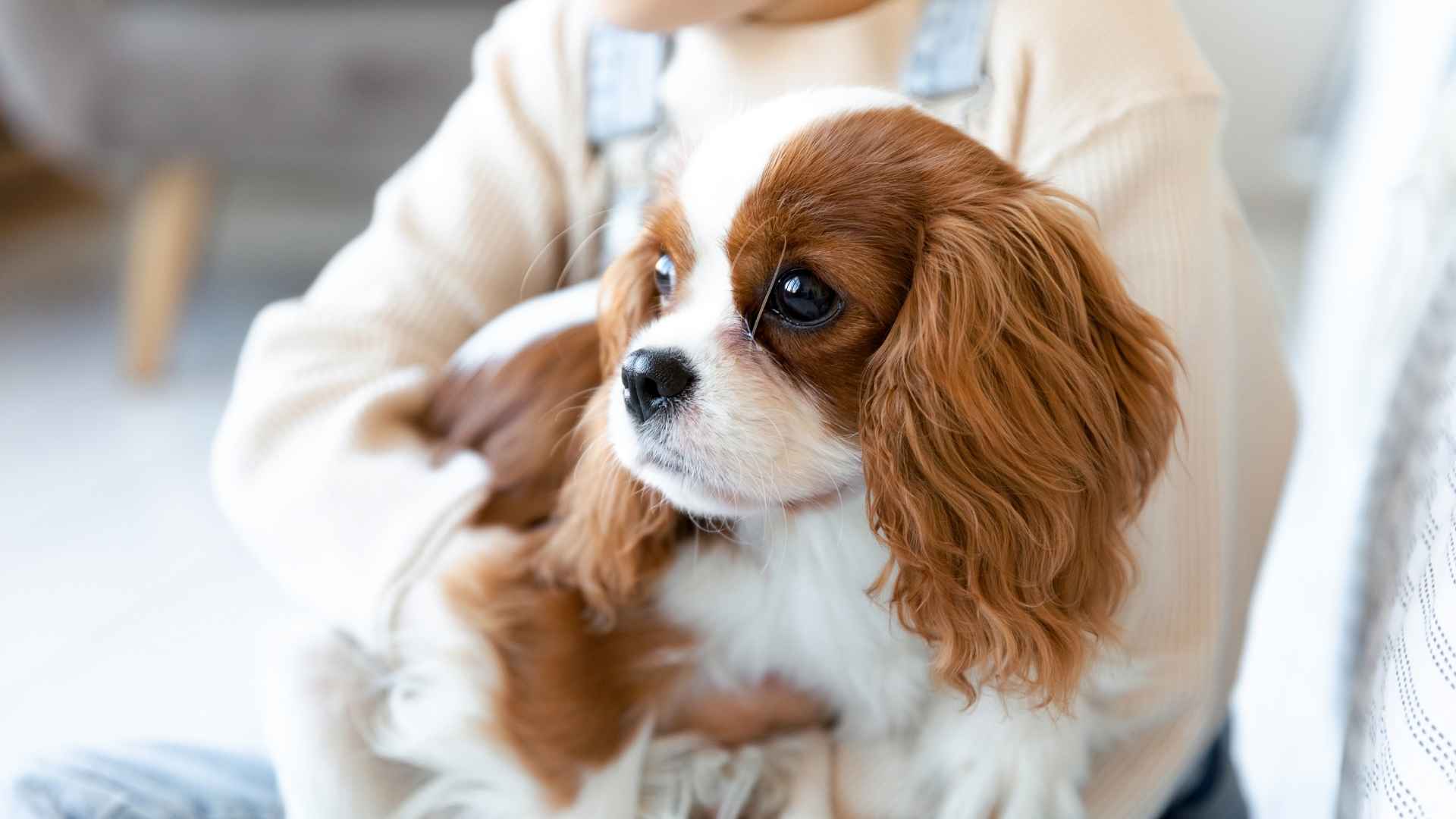Sometimes, words aren’t enough. Sometimes, all it takes is a soft head resting on your lap, a warm body curled beside you, or a pair of big, soulful eyes to remind you that you’re not alone. That’s the magic of emotional support dogs—the quiet heroes who offer comfort, stability, and love just by being there.
These pet dogs aren’t just dogs; they’re companions with intuition. An emotional support dog can help alleviate the symptoms of mental health issues like anxiety and depression. Although they don’t need specialized training, some breeds are better suited to serve as emotional support animals.
Whether you’re struggling with stress, battling depression, or navigating the ups and downs of life, certain dog breeds are more naturally inclined to offer emotional support. They’re known for their gentleness, sensitivity, and loyalty.
Here, we’ll introduce you to the most emotionally intelligent and gentle dog breeds—the ones that were practically made to be therapy dogs or emotional lifelines. So if you’re seeking more than just a pet—if you’re looking for a furry friend who “just gets it”—this list is for you. Let’s meet the dogs who heal hearts with every wag.
Gentle Emotional Support Dog Breeds
1. Cavalier King Charles Spaniel

If emotional support had a fluffy, button-eyed face, it would be this dog. The Cavalier King Charles Spaniel doesn’t just look like it belongs on a velvet pillow—it acts like it, too.
The Cavalier King Charles Spaniel was originally bred as a companion dog, and today, they enjoy staying close to their owners, often preferring to be by your side or in your lap. Cavaliers are a petite breed, typically reaching 12 to 13 inches in height and weighing between 13 and 18 pounds.
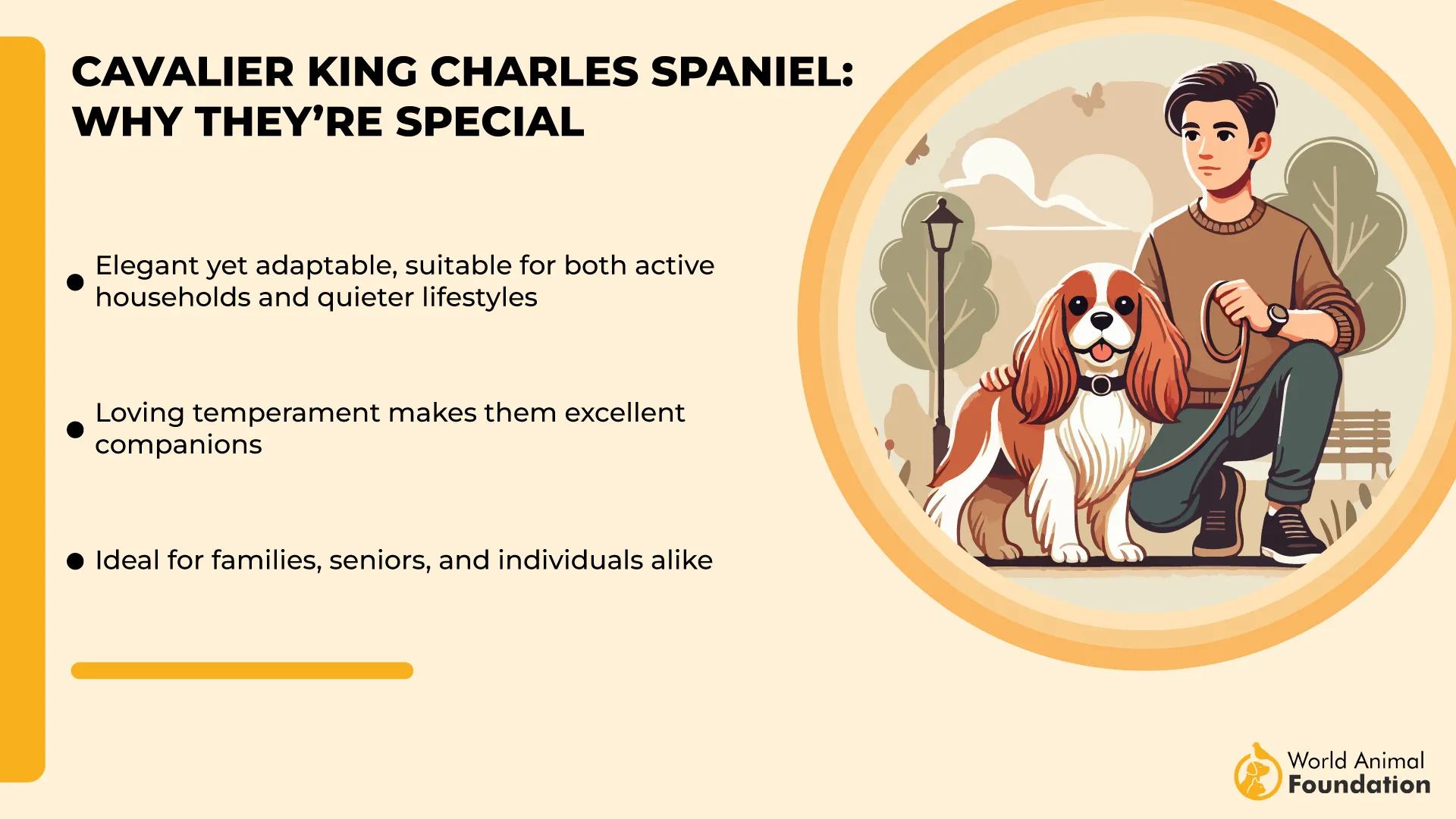
Personality: Gentle, affectionate, and always down for a snuggle. These pups have a sixth sense for when you’re sad and will instantly teleport to your lap with all the emotional bandwidth of a tiny, tail-wagging therapist.
Vibes: Think of them as living, breathing plush toys that listen when you say, “I’ve had a rough day.”
Fun Fact: They’ll follow you around the house like a four-legged shadow—except this shadow occasionally stops to wag and demand cuddles.
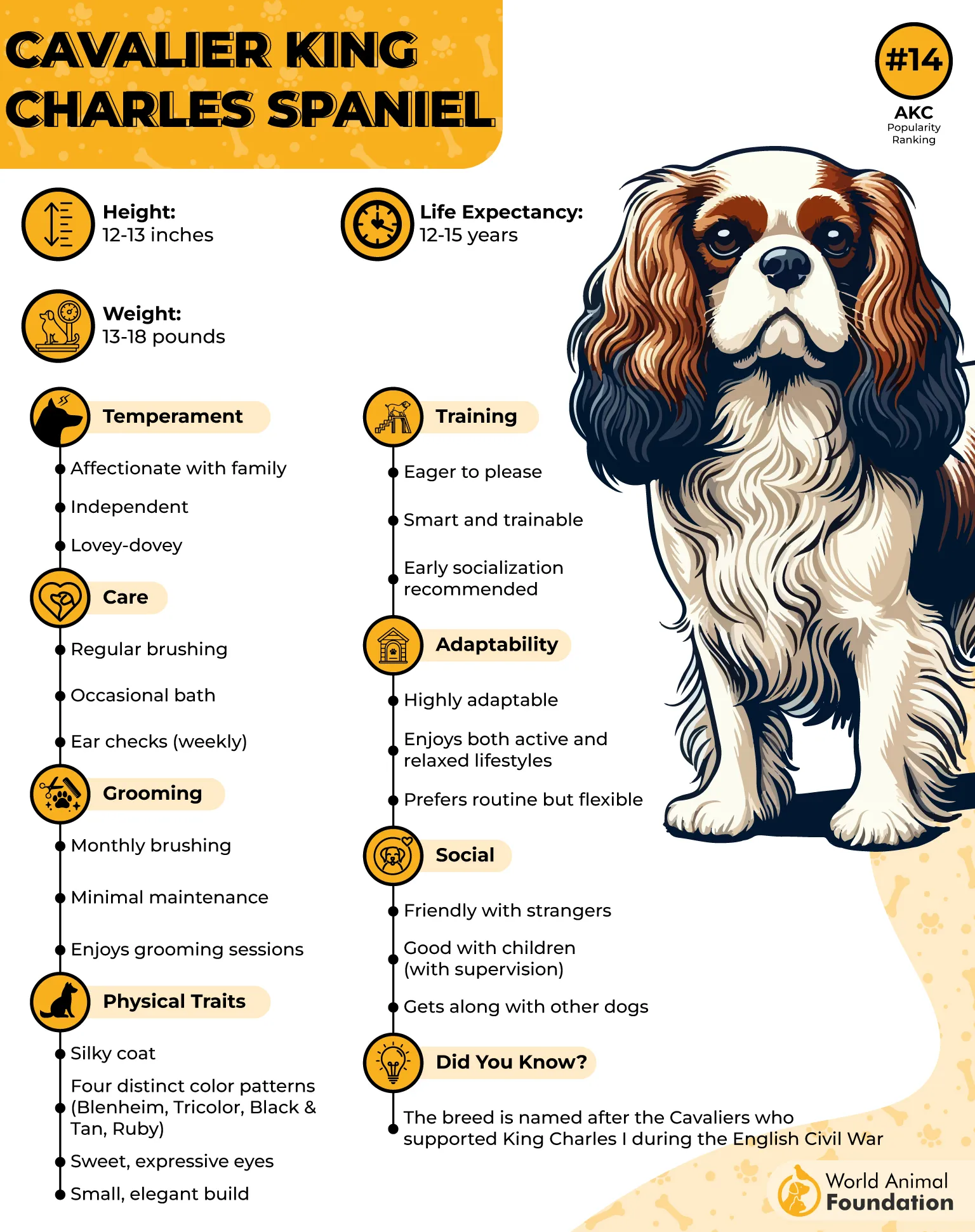
As noted by PetMD, Cavalier King Charles need regular human interaction and companionship to thrive and should not be left alone for extended periods.
Cavalier King Charles Spaniels are eager to please, easy to train, and highly intelligent. They excel in various canine sports, including obedience.
2. Golden Retriever
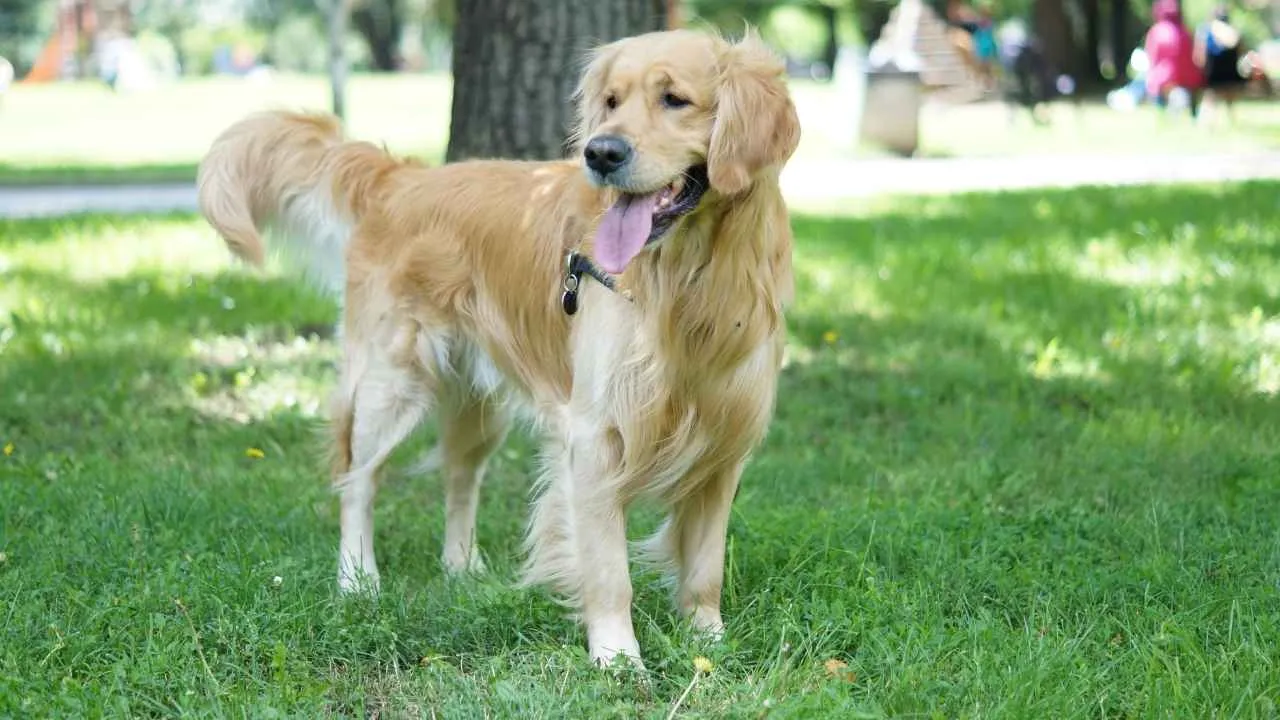
If joy could grow fur and give high-fives, it would be a Golden Retriever. These sunshine-soaked sweethearts are the poster dogs for emotional support—and for good reason.
Golden Retrievers have an impressive ability to sense and respond to human emotions, making them exceptional companions during both joyful and challenging moments. Their calm demeanor and empathetic nature offer comfort and support, often acting as a soothing presence for their owners.
Personality: Friendly, empathetic, patient—energy you want when life hands you lemons, and you’ve run out of sugar.
Why They Work: Golden Retrievers have an uncanny ability to know when you need a nudge, a paw, or just a goofy smile that says, “Hey, it’s gonna be okay.”
Bonus Skill: Expert tail-waggers, amateur therapists, and professional snack beggars. But honestly, when your emotional support dog makes you laugh this much, they’ve earned a few treats

Due to their high energy and grooming needs, Golden Retrievers can be quite high-maintenance for some owners. Their beautiful coat requires regular grooming to prevent matting, particularly during shedding season.
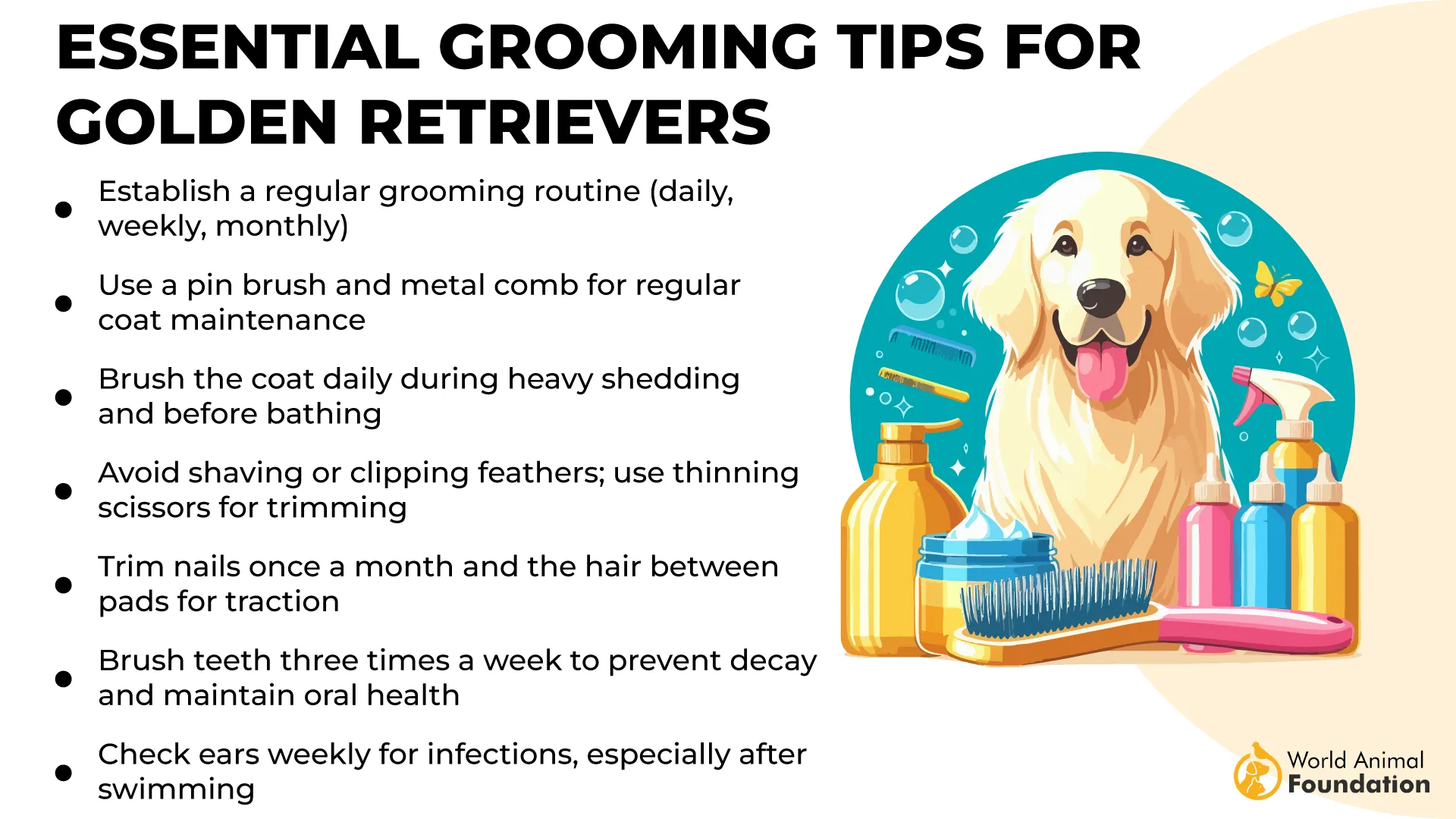
In addition, their active minds need constant physical and mental stimulation. Golden Retrievers also require plenty of exercise and shouldn’t be left alone for long periods, as they can be prone to separation anxiety.
3. Labrador Retriever

Labs are imals wrapped in fur and powered by tail wags. Need a hug? A reason to smile? Someone to look at you like you hung the moon and have snacks in your pocket? The Labrador’s got your back.
Labrador Retrievers have a natural love for water, a trait that dates back to their origins as working and hunting dogs alongside fishermen.
Labrador Retrievers are naturally intuitive and emotionally intelligent, often sensing their owner’s moods and offering comfort without being prompted. This innate ability to empathize, combined with their gentle nature and eagerness to please, makes them ideal not only as therapy or service dogs but also as deeply loyal emotional support companions.
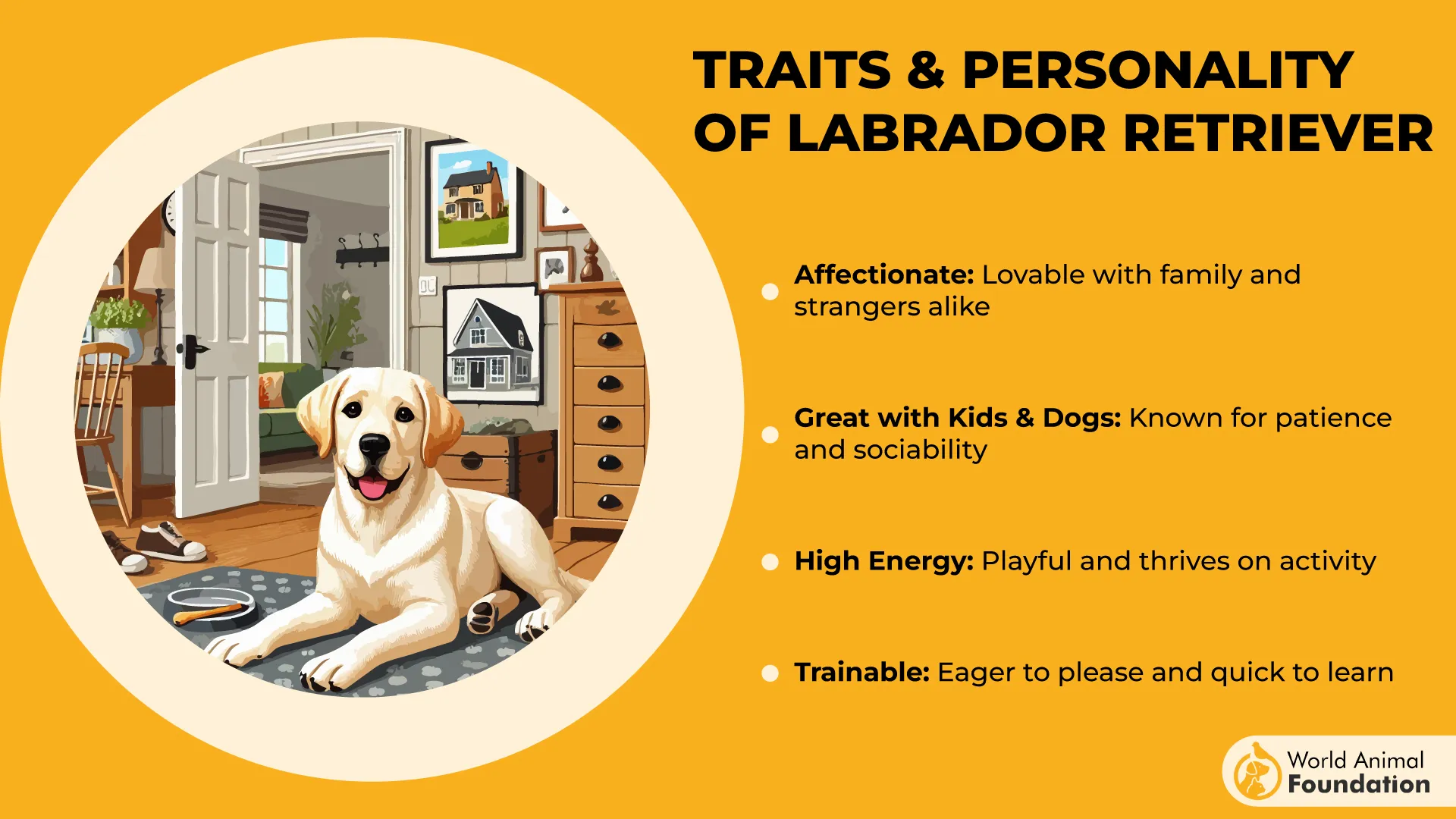
Personality: Loyal, affectionate dogs, often playful, and always happy to be wherever you are, doing whatever you’re doing, as long as you’re doing it together.
Vibe Check: Labs are like that one best friend who’s somehow always in a good mood, never cancels plans, and thinks you’re the greatest human on Earth.
Fun Fact: Their love language is fetch, but their real superpower is making stress melt faster than ice cream on a summer sidewalk.
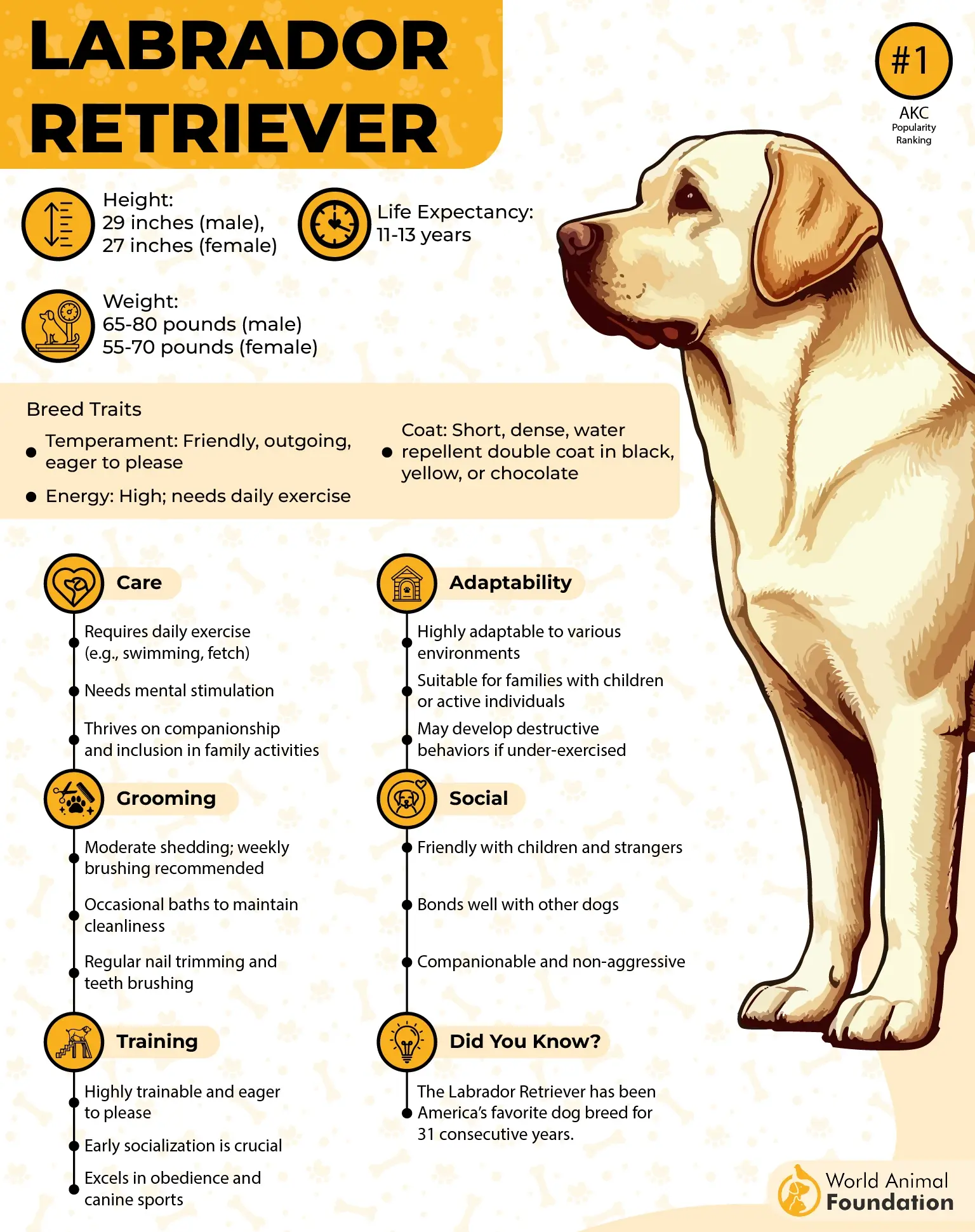
While they’re friendly and get along with nearly everyone and forming deep bonds, their high energy and wagging tails can pose a risk to toddlers and young children, as they might accidentally knock them over.
Labrador Retrievers require plenty of exercise and attention to stay happy. On average, they need about an hour of physical activity each day to keep them content and well-balanced.
4. Pug
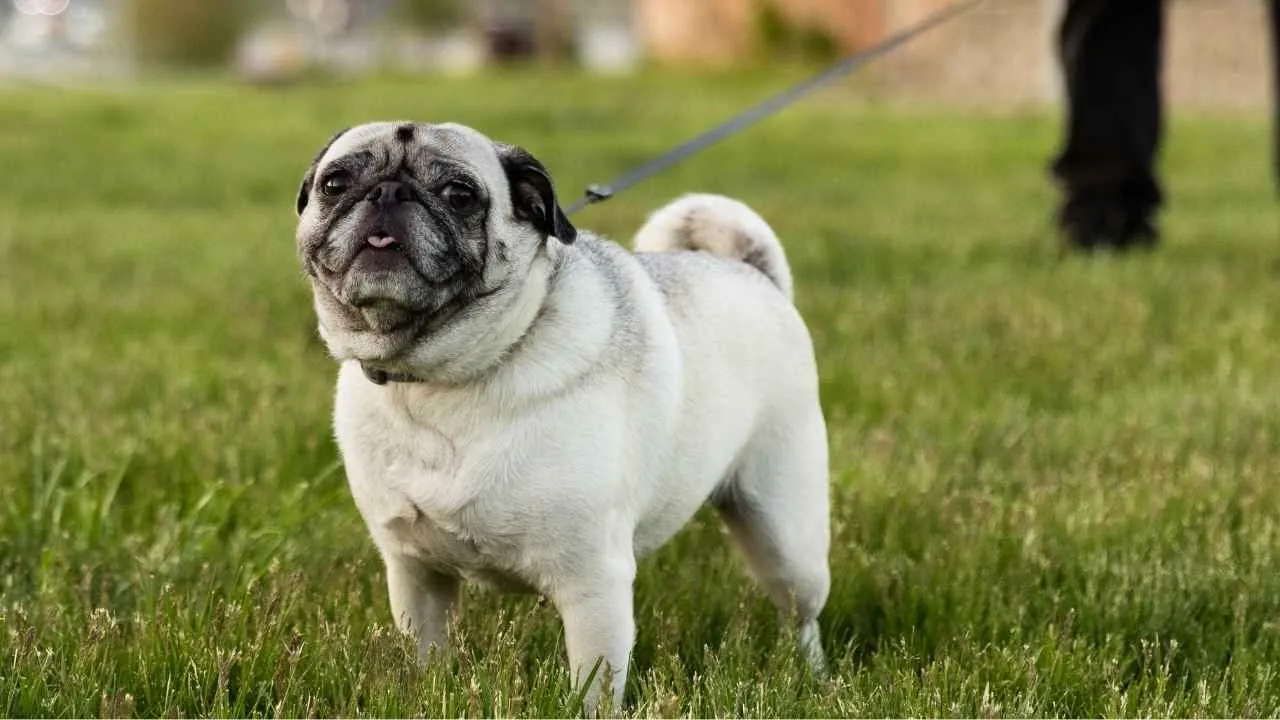
Ah, the Pug—compact, wrinkly, and ready to emotionally support you while wheezing dramatically. If you’ve never been comforted by a loaf-shaped dog who sounds like a tiny piglet, you’re missing out.
Although Pugs are too small to perform major service dog tasks like retrieving items or providing pressure therapy, they make loving and affectionate therapy dogs. Their small size also makes them less intimidating to young children or individuals who may feel uneasy, which is often the case for those who rely on therapy dogs.
Personality: Silly, sweet, and a touch dramatic (okay, a lot dramatic). They’ll follow you around like a furry shadow with a built-in comedy routine.
Support Style: Emotional support by distraction. Feeling sad? Watch your Pug chase its tail or attempt to bark with its whole body, and forget your problems instantly.
Fun Fact: Pugs are professional snugglers. If you sit down, they assume it’s an invitation to nap on your lap—immediately. No RSVP necessary.
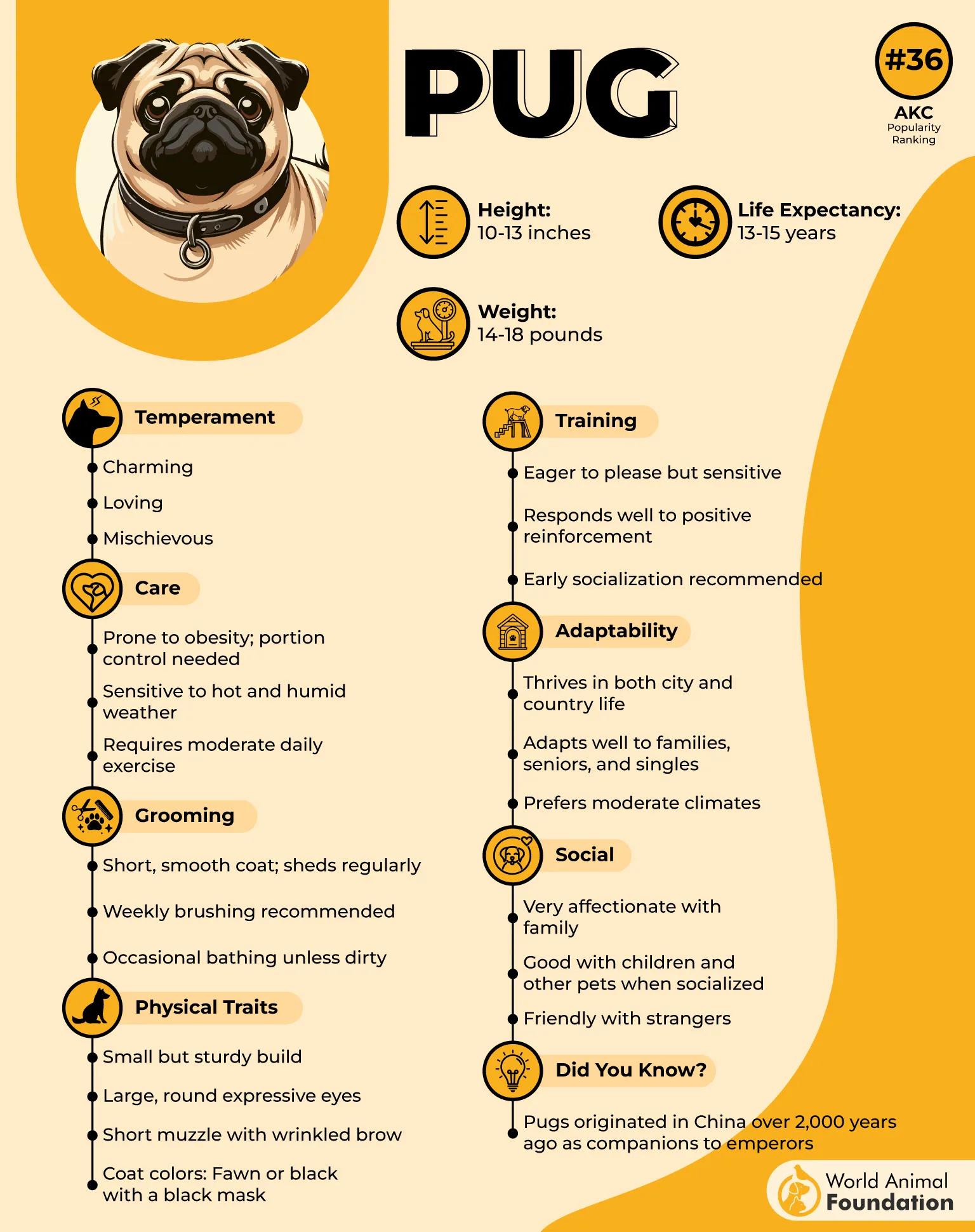
Pugs can give a calming presence and quiet, but they also have playful, mischievous moments. They make great companions if you can provide them with the attention they need, though they dislike being separated from their loved ones for long periods.
5. Shih Tzu

Don’t be fooled by the fancy name and luxurious locks—the Shih Tzu is less diva and more “namaste in bed with you all day.” These little fluffballs were bred for royalty, and let’s just say… they haven’t forgotten it.
The Shih Tzu, believed to be a cross between a Pekingese and a Lhasa Apso, originated in China. Its name, “Shih Tzu,” translates to “lion” in Chinese.
Their love for attention makes them particularly comforting companions when you’re navigating emotional ups and downs, as they eagerly offer affection and companionship during both good times and bad.
Personality: Calm, loving, and low-key, the perfect roommate. They’re happy to sit with you during a movie, a meltdown, or a meditation session—whatever your vibe is, they’re in.
Support Style: Quiet comfort. They won’t lecture you, bark your ear off, or judge your snack choices. They’ll just blink slowly at you like, “It’s okay. Life’s hard. Take a nap.”
Fun Fact: Their name means “lion dog,” but emotionally? They’re more teddy bear than predator.
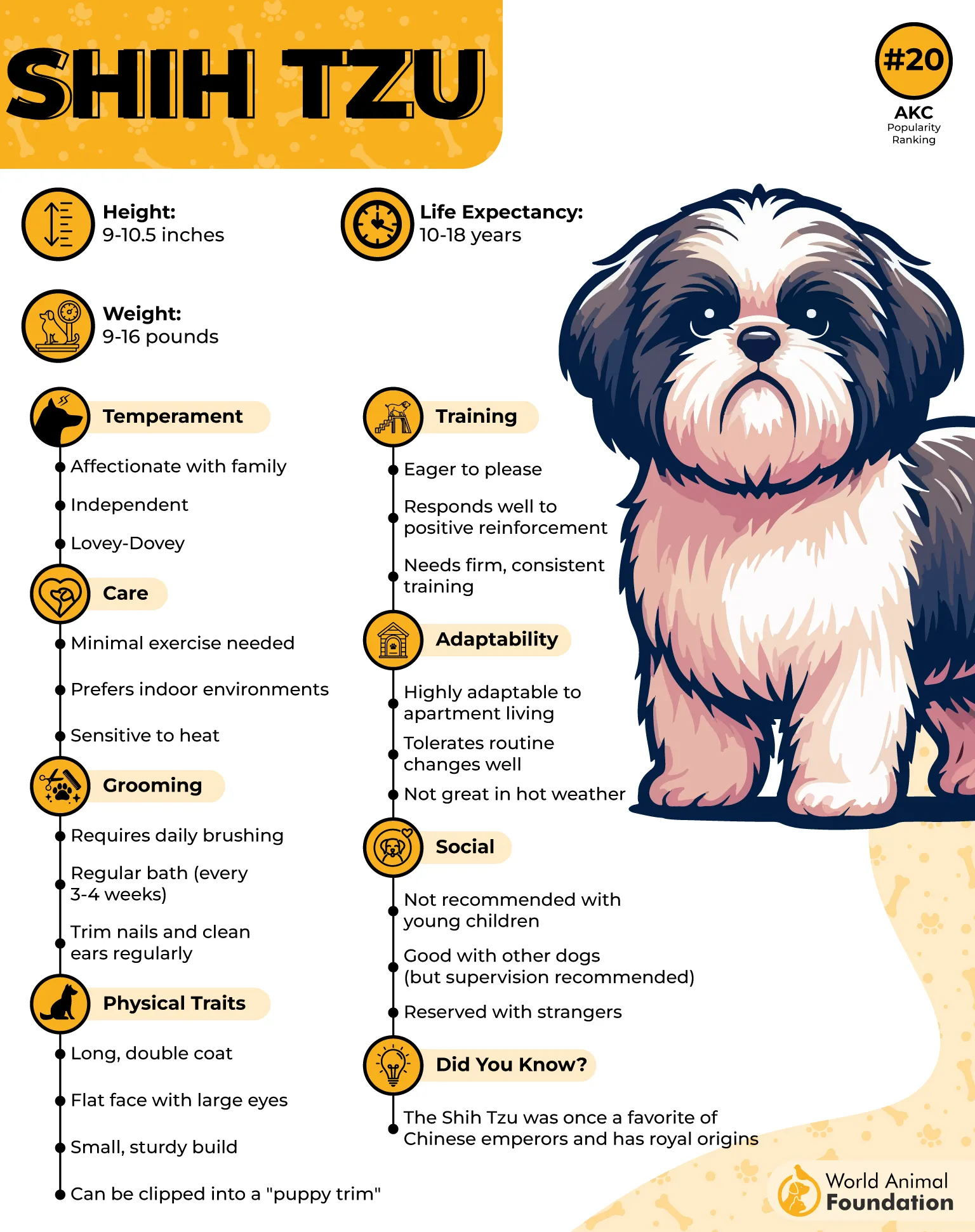
They thrive on human interaction and are quick to respond to emotional cues, often providing just the right amount of comfort when it’s needed most. Their playful antics and comforting presence make Shih Tzus excellent companions for therapy, offering smiles, unconditional love, and emotional support to those in need of a loyal and uplifting friend.
Shih Tzus are well-suited for apartment living spaces, can be a great fit for apartment dwellers, as they don’t require much room. Bred as indoor dogs and originally kept as royal pets in palaces, they don’t need extensive exercise.
Shih Tzus are intelligent dogs, so it’s important to keep them mentally engaged to avoid boredom. Teaching them new tricks is a great way to provide them with a stimulating mental workout, as noted by WebMD.
6. French Bulldog

French Bulldogs, or “Frenchies,” are indeed cherished for their easygoing and happy nature. With their bat ears, squishy faces, and zero concept of personal space, Frenchies are the emotional support clowns you never knew you needed.
Bulldogs are compact, sturdy little dogs with a broad, heavily muscled chest and a petite body. Despite their small size, they have a solid build that gives them a strong and sturdy appearance. Their stocky frame is characteristic of the breed, contributing to their unique and recognizable look.
Their affectionate temperament, combined with their small size, makes them perfect companions for various living situations, from apartments to homes with yards. They’re also known for being relatively low-maintenance and adaptable, which adds to their appeal.
Personality: Chill but mischievous. They’ve got a snuggly side and a “Let’s knock this over just to see what happens” side. It’s all part of the charm.
Vibe Check: The friend who makes you laugh during a serious moment, helps you cry when you need it, then shares your snack like it’s a sacred ritual.
Fun Fact: They snore like an old man and act like a toddler who just discovered they can get away with anything. 10/10 would cuddle again.
French Bulldogs are playful, curious, and love to be the center of attention. They thrive on human interaction and enjoy being involved in family activities. Their playful antics and charming personalities make them a hit in most homes!
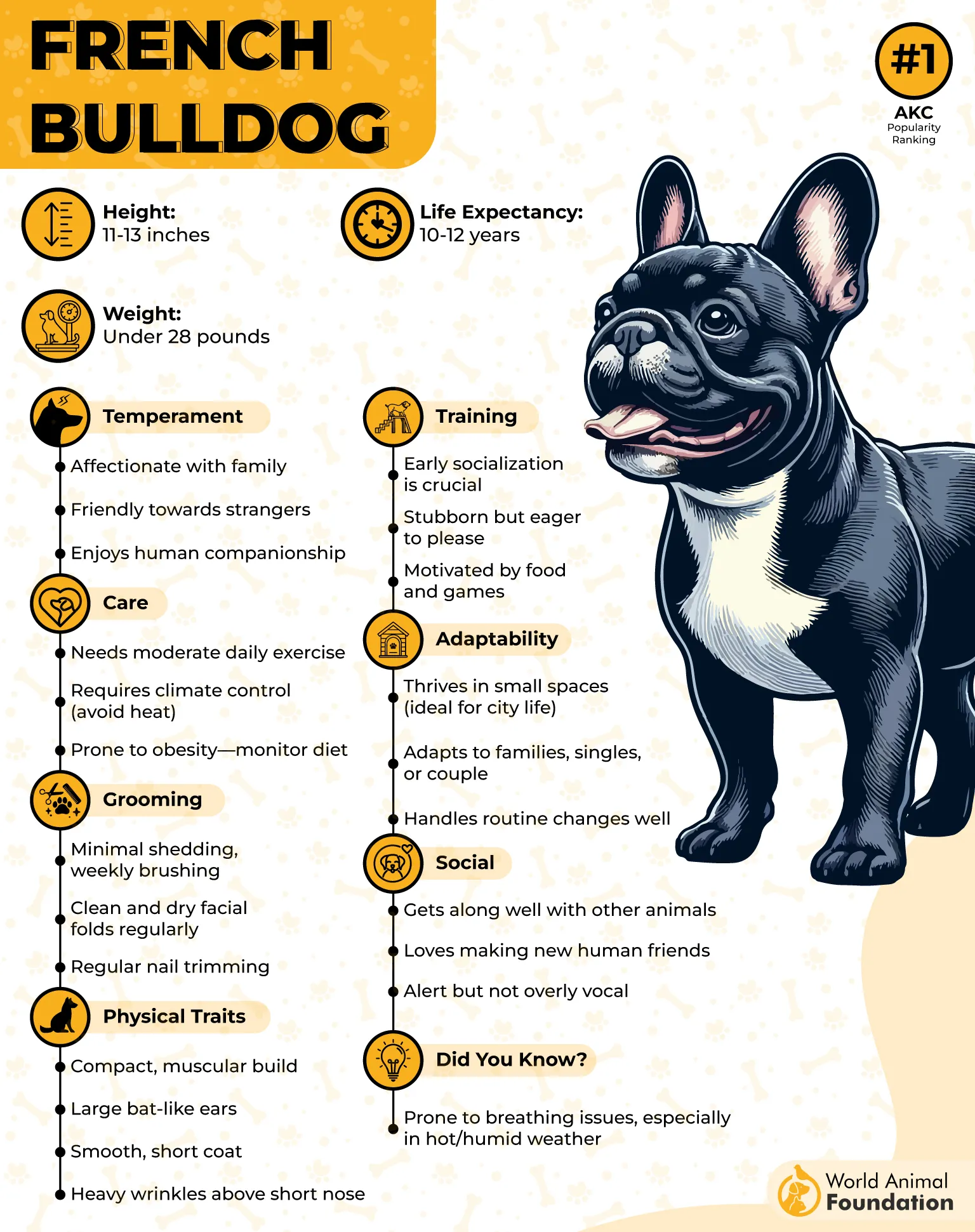
Their moderate exercise needs and straightforward grooming requirements make them manageable for most pet parents.
However, their brachycephalic (short-nosed) facial structure can lead to certain health concerns, especially with breathing difficulties. Frenchies can struggle in hot weather, so it’s important to avoid over-exertion and ensure they stay cool.
7. Border Collie
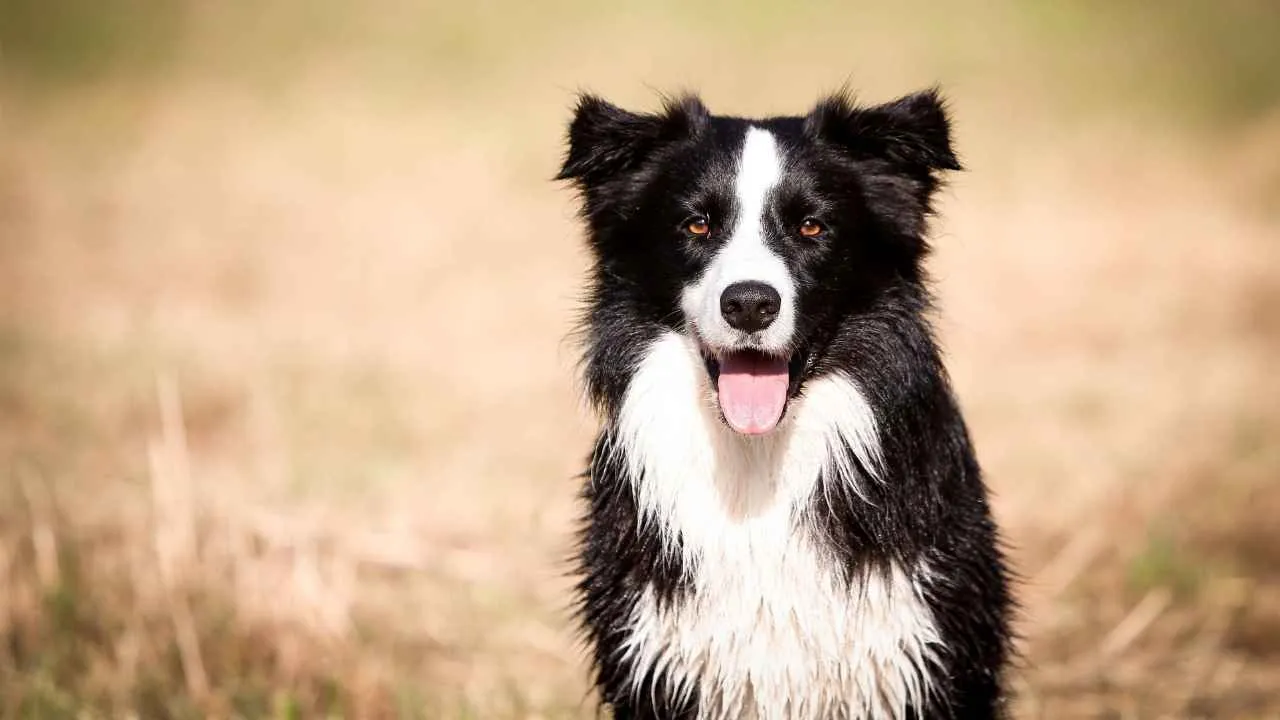
Border Collies aren’t just smart—they’re scary smart. If anyone can provide support and remind you where you left your keys, it’s this dog.
Border Collies’ exceptional trainability and friendly nature make them great candidates for therapy dogs, especially in environments where they can interact with strangers. Their intelligence and eagerness to work are key traits that allow them to excel in such roles.
However, they may not always be the best fit for families with young children, as their high energy levels and need for mental stimulation can sometimes make them too intense or overwhelming for kids. Their intellect and trainability mean that they thrive in environments where they can be mentally challenged, and they require regular tasks or activities to keep them content.
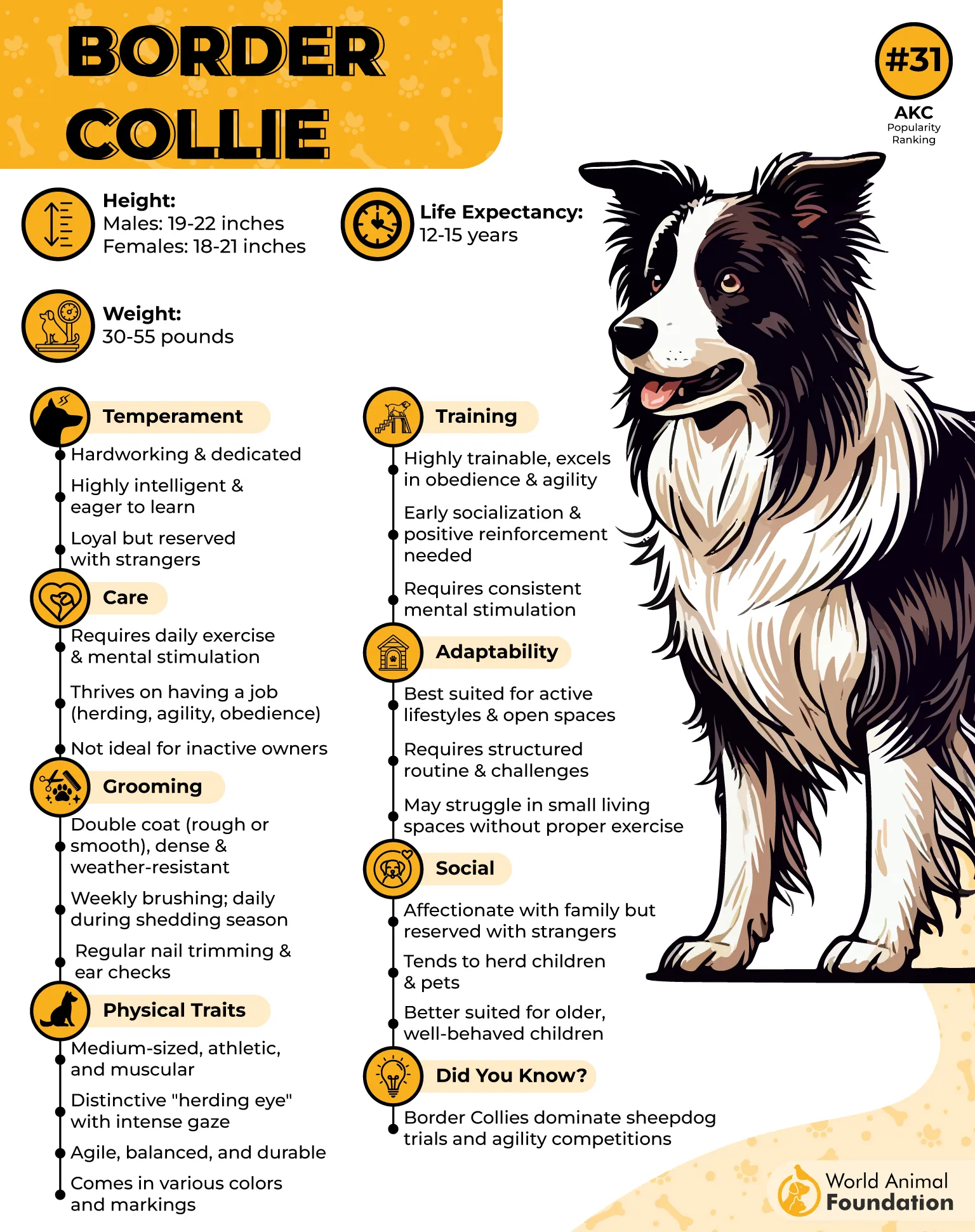
Personality: Loyal, sensitive, and laser-focused. They pick up on your mood changes like they’ve got a built-in mood ring… with fur.
Support Style: Active encouragement. If you’re feeling down, they’ll try to herd you outside for fresh air and throw in a few tricks just to make you smile.
Fun Fact: Don’t let them get bored. A bored Border Collie will reorganize your house or start a sheep-herding business in your living room.
Border Collies are highly social and get along well with other dogs and even cats, especially when introduced and socialized at a young age.
PetPlan says their intelligence and energetic nature require daily long walks and plenty of playtime to keep them happy and engaged. Without enough mental stimulation, they can become bored and develop mischievous behaviors.
Regular grooming is necessary, but they’re not high-maintenance in terms of trips to the groomer. Weekly brushing usually suffices to keep their coat healthy.
Conclusion
When it comes to choosing the right emotional support animal, finding a breed that can provide comfort, affection, and unconditional love is essential. Many gentle emotional support dog breeds tend to form strong bonds with their owners, making them excellent for individuals coping with mental health conditions such as anxiety, panic attacks, or post-traumatic stress disorder. While certain breeds like the Yorkshire Terrier are known for their expressive eyes and loyalty, others, such as herding dogs and compassionate dogs, also offer significant therapeutic benefits.
The energy level and emotional needs of different dogs should be considered, especially when seeking anxiety relief or emotional grounding. While some breeds may have a high-maintenance coat, their ability to provide comfort can outweigh grooming needs. It’s also important to note that emotional support animals don’t require specific training like service dogs, but must be prescribed by a licensed mental health professional to be protected under federal law and enjoy the same rights in housing situations.
Whether you’re rescuing a specific dog through animal rescue or searching for the perfect breed to integrate with other pets, the goal is to find the right breed that matches your lifestyle and emotional needs. Excellent emotional support animals come in many forms, and with the right connection, they can be a life-changing source of healing, love, and security.


